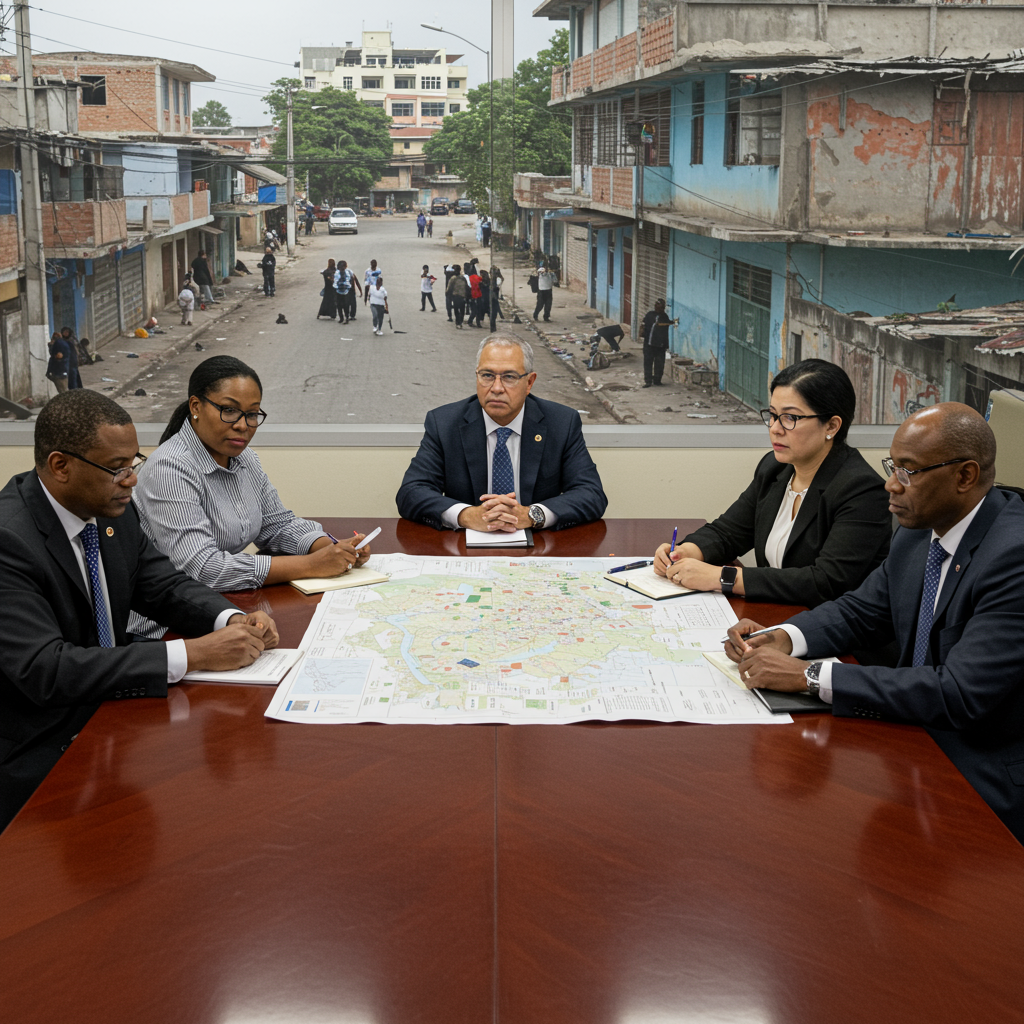Haiti’s capital, Port-au-Prince, faces a catastrophic security breakdown. Senior United Nations officials recently issued urgent warnings, revealing that criminal gangs now hold “near-total control” over the city. This escalating violence has overwhelmed state authorities across the vulnerable Caribbean nation, pushing the situation closer to the brink of total collapse. The international community’s response remains critically underfunded and understaffed, struggling to counter the overwhelming power of these armed groups. This dire assessment paints a grim picture for the future of Haiti and its people.
Haiti’s Capital Under Siege: The Extent of Gang Dominance
The scale of gang power in Port-au-Prince is staggering. According to Ghada Fathy Waly, executive director of the U.N. Office on Drugs and Crime, an estimated 90% of the capital is now under the firm grip of criminal organizations. These groups are not merely holding territory; they are actively expanding their reach.
Their influence is spreading beyond the capital’s immediate surroundings. Previously peaceful areas are now experiencing a sharp increase in gang-related incidents.
Southern Haiti, long insulated from the intense violence plaguing other regions, has seen a significant rise in criminal activity. Gangs are also exploiting key land routes in Eastern Haiti. This includes critical border crossings like Belladere and Malpasse, where police and customs officials have come under attack. This territorial expansion demonstrates a clear strategy by gangs to solidify their power base and control vital infrastructure.
Life Under Gang Rule: A Collapse of Public Services
The expanding footprint of criminal groups has direct and devastating consequences for daily life. State authority is rapidly diminishing as gang control grows. Criminal groups are effectively stepping into the vacuum left by the absence or severely limited delivery of public services.
They are establishing what the UN describes as “parallel governance structures.” This means gangs dictate terms, impose rules, and control access in areas where the government has failed to provide basic functions. Gang control over major trade routes has crippled legal commerce. This paralysis has led to severe shortages and soaring prices for essential goods. Cooking fuel and rice, a staple food for Haitians, have become increasingly unaffordable. This economic stranglehold exacerbates the humanitarian crisis, making basic survival a daily struggle for residents.
Challenges to Governance and Security in Haiti
The current security crisis is deeply rooted in Haiti’s political instability. Gangs have significantly increased their power since the assassination of President Jovenel Moïse in July 2021. Haiti has been without a president since that event.
While gangs were previously estimated to control about 85% of the capital, the current assessment of 90% indicates a rapid and worrying consolidation of their power. The lack of a stable, functioning government creates a void that criminal groups are eager to fill.
Transitional governing bodies have struggled to mount an effective response. U.N. experts point to competing political ambitions and allegations of corruption within these bodies. This internal disarray has stymied efforts to address the security crisis decisively. The environment is ripe for exploitation by gangs. Their territorial expansion provides them with additional sources of revenue and bargaining power. However, experts warn these attacks are also backed by individuals. These actors are trying to destabilize the political transition for their own political gain.
The International Response: Understaffed and Underfunded
Addressing Haiti’s gang crisis requires robust international support. A U.N.-backed mission led by Kenyan police arrived in Haiti last year. Its goal is to help quell the rampant gang violence.
However, this critical mission faces significant hurdles. It remains severely understaffed and underfunded. The mission currently operates with only about 40% of the 2,500 personnel originally envisioned. This limited capacity severely hampers its ability to make a significant impact against well-armed and entrenched criminal groups.
A proposal put forth by U.N. Secretary-General Antonio Guterres in February aimed to provide non-lethal support to the Kenya-led mission. This support would include drones, fuel, ground and air transport, and other logistical aid. Despite the urgent need, this crucial proposal has languished in the U.N. Security Council. The delay in approving and delivering necessary resources leaves the international force operating at a disadvantage. It underlines the challenge of mobilizing sufficient global support to match the scale of the crisis on the ground.
The Complex Landscape of Violence: Gangs, Police, and Vigilantes
Haiti’s security situation is complicated by multiple actors engaged in violence. Beyond the established gangs, there has been a rapid growth in private security companies and vigilante self-defense groups.
Some of these vigilante groups genuinely try to protect their communities from gang brutality. However, others operate illegally. Some are even reported to collude with gangs themselves. This creates a confusing and dangerous environment where distinguishing protectors from perpetrators is difficult. Worryingly, U.N. officials report these groups have engaged in extrajudicial killings. Over the last three months, vigilantes reportedly killed at least 100 men and one woman suspected of gang association or collaboration.
Gangs are also directly responsible for horrific acts of violence. The U.N. political mission in Haiti documented 364 incidents of sexual violence involving 378 survivors in just March and April. This sharp increase highlights the use of sexual violence as a weapon of control and terror.
Adding another layer of concern, the Haitian National Police have also come under scrutiny. U.N. experts report a “worrying number of extrajudicial killings” by the police. Suspected gang members are often summarily executed by specialized police units. There were reports of 281 such summary executions in 2024 alone, including 22 women and 8 children. This raises serious human rights concerns and further erodes trust in state institutions intended to provide security.
Arms Flow and the Dire Outlook
Despite a U.N. arms embargo on Haiti, criminal gangs continue to acquire more powerful weapons. This flow of illicit arms fuels the violence and enhances the gangs’ capacity to challenge state authority.
Weapons enter the country not only from regional civilian markets but also, disturbingly, from police stockpiles. Reports indicate gangs are obtaining weapons from police forces within Haiti and the neighboring Dominican Republic. This suggests corruption or negligence is contributing directly to the gangs’ armament.
With a national police force described as weak and facing acute tensions in its leadership, an army that needs significant rebuilding, and the multinational force’s limited capacity, the outlook remains bleak. U.N. experts warn that gangs will continue “to have the upper hand.” This will persist unless stronger international support is provided urgently. The current trajectory suggests minimal progress can be made toward restoring public security. The roadmap for organizing national elections by February 2026 also appears increasingly unlikely under these conditions.
Frequently Asked Questions
What is the current extent of gang control in Haiti’s capital?
According to senior United Nations officials, criminal gangs now control an estimated 90% of Port-au-Prince, Haiti’s capital. This represents a significant increase in their territorial hold compared to previous assessments. Gang influence is also rapidly expanding beyond the capital into surrounding areas and previously peaceful regions, including parts of Southern and Eastern Haiti, affecting key trade routes and border crossings.
What international efforts are underway to address Haiti’s gang violence?
A U.N.-backed multinational security mission, led by Kenyan police, was deployed to Haiti to help combat gang violence. However, this mission is currently operating significantly below its planned capacity, with only about 40% of the personnel originally envisioned. A proposal by the U.N. Secretary-General for non-lethal support like drones and transport has not yet been approved by the Security Council, leaving the mission critically under-resourced.
How is escalating gang control affecting daily life for people in Haiti?
The extensive gang control is causing immense hardship. Gangs are establishing “parallel governance” in controlled areas, filling the void left by absent public services. Their control of major trade routes has paralyzed legal commerce, leading to severe price increases for essential goods like food and fuel. This economic pressure, combined with widespread violence including sexual violence, displacement, and limited access to basic services, has created a dire humanitarian crisis affecting millions of Haitians.
Conclusion: A Crisis Demanding Urgent Global Attention
The warnings from senior U.N. officials underscore a rapidly deteriorating situation in Haiti. Criminal gangs have achieved unprecedented control over the capital, effectively seizing governance in large parts of the city and extending their violent reach nationwide. This dominance paralyzes the economy, fuels a humanitarian crisis, and obstructs any path towards political stability or future elections. The existing security forces and the international support mission are currently outmatched. Without a significant and urgent increase in international resources and coordinated action, the U.N. warns that a total collapse of state presence in Port-au-Prince is a very real and imminent scenario. Addressing this crisis demands not just security intervention but also sustained efforts to support legitimate governance, restore public services, and protect the rights of Haitian citizens trapped by the violence.



